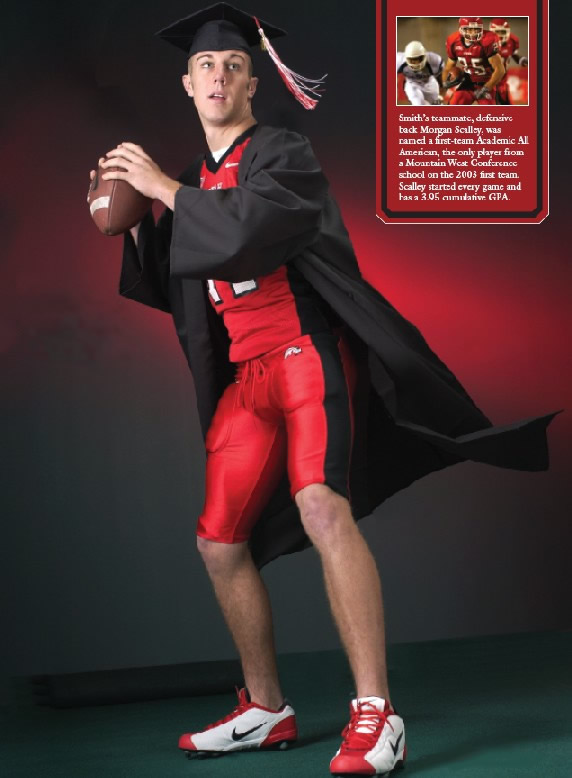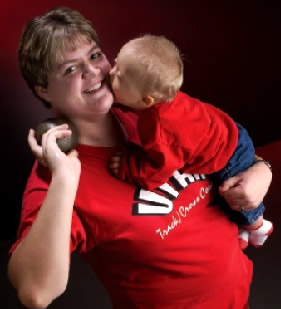|

Think all student-athletes are the same?
Meet three who might surprise you.
PHOTOS BY SKIP SCHMIETT
 |
Alex Smith, Quarterback Ranked No. 12 in the nation for pass efficiency |
“Alex Smith, you and your team won Utah’s first outright conference title since 1957, shut out BYU for the first time in 28 years, won the Liberty Bowl, and made Urban Meyer The Sporting News’ national coach of the year (as well the conference’s coach of the year) in his first season at the U! Whatcha gonna do now—go to Disneyland?”
“Well, no, I thought I’d go to my room and hit the books, but the cafeteria opens in five minutes, so….”
No, Smith didn’t actually say that. But he might have. Books ’n’ burgers are a big part of this slender quarterback’s daily fare and figure to play a large role in his future.
Stardom may well await the lanky 19-year-old Californian. But first there’s a matter of pomp and circumstance. On May 7, at the close of his sophomore year, Smith will receive his undergraduate degree in economics with a GPA around 3.8. The date will also be his 20th birthday.
Shortly thereafter, he’ll apply to the University’s MBA program. If all goes well, he’ll complete it in his junior year as the multitalented quarterback for the Mountain West Conference football champions. Already he’s thinking about law school.
Smith’s formative years didn’t portend his great leap forward in 2003. As a youngster he played soccer and baseball and had Grandpa teach him golf. As an eighth grader he played Pop Warner football as a tackle and tight end. A couple of years later, Smith led San Diego’s Helix High School team to a 25-1 two-year record. But success also hurt his statistics. When Helix would pile up points on opponents early in games, Smith would get yanked. He only played two full games as a senior.
When recruited by colleges, Smith’s stats didn’t compare well with those of other quarterbacks. Northwestern, several Ivy League schools, Southern Cal, and Washington all looked at him, but he was looking at Louisville and Utah for football and academics. When his uncle “John L.” (Smith), Louisville’s coach, said he wasn’t sure he’d be there for four years, Smith’s decision “made itself.” The U accepted his 64 Advanced Placement credit hours, so he matriculated academically as a junior.
His redshirt freshman year was blown when he played one series in a game Utah was losing. The second year brought a coaching change: McBride out, Meyer in. Unhappy, Smith briefly considered leaving. But Meyer immediately installed “a lot more discipline, responsibility on and off the field, and accountability,” an atmosphere Smith says he thrives in.
Smith competed fiercely in spring practice with erstwhile starter and best friend Brett Elliott. Then he developed back problems and wasn’t ready for the season opener. Elliott got the call. In the second game, Elliott suffered a broken wrist on the last play. Still hurting in his first start, Smith toughed out the California game, then a bye week gave his back a chance to heal. He started the next game, and every one after that.
In short order, Smith has had big bites of success. At his coach’s insistence, he’s become cafeteria minded, an all-I-can-eat chomper at every meal. Next year, Meyer wants Smith to take the field at about 220 pounds. That means lots of double-size dinners. Mentally and physically, it seems, he’s bulking up. Want fries with that?
Natasha
Eldrige |
 |
To some, a 40-minute commute between Tooele and the U would seem like forever. And that’s what Natasha Eldridge thought at first. But after three years, she’s turned the routine into her personal stress-relief time. No pounding music, no yammering talk radio. “I just sit and drive,” says Eldridge, as she pages through a mental logbook and plans how to meet the daily demands on her time and temperament.
In Eldridge’s world, fulfilling the various obligations of wife-mother-scholarship athlete- graduating senior leaves little time for reflective relaxation. “You don’t think, you just do,” she asserts.
Eldridge was recruited out of Tooele High School as a shot-putter and hammer thrower, and life looked rosy. The U had been her “dream school” since she was five. Lest she forget, her aunt, Anita Keetch BS’86, kept her supplied with Ute hats and sweatshirts through the years.
After her boyfriend, Jonathan, returned from a church mission, he and Natasha were married. They agreed that she would complete her degree, then it would be Jonathan’s turn. (Eldridge will graduate in May with a bachelor’s in therapeutic recreation.) At that point, life looked relatively simple.
But when Alexander was born, they learned he had Down syndrome, and ripples appeared on life’s calm waters. Natasha and Jonathan parceled their lives so their now year-old son could get the support and attention he needs. Jonathan took a crash course by Internet to learn all he could. They made appointments with a geneticist, cardiologist, and a pulmonary specialist to ensure that Alexander had no associated complications. Down syndrome children, Eldridge notes, often have obstructive sleep apnea and their body tubes—ear, esophagus, nasal and anal passages, etc.—are smaller than normal. Alexander does not have facial characteristics common with Down children, and personal differences are not readily evident. He’s happy and energetic.
The Eldridges deal with issues as they arise and don’t get uptight about what might be ahead. Natasha admits to being a “closet worrier,” but says laid-back Jonathan helps her focus on the present.
Her family has also played a major role. Mom, Grandma, and a sister step up immediately to help care for Alexander when Natasha is in school or training and Jonathan is working, and to allow them time for an occasional movie. When questions about Alexander arise, Aunt Anita helps research the answers.
As she works hard to better her skills, Eldridge has learned to deal with the pressures of athletic competition. She has competed in the shot put since grade school and also throws the 20-pound weight. It is much like the hammer but heavier, and is used at indoor meets since it can’t be thrown as far. While strength is important in her events (Eldridge is 6 feet 1 inch, a weight lifter, and self-described as “bulky”), technique is paramount.
Now 24, Eldridge sees herself eventually working with children with disabilities. Personable, articulate, and committed, she’ll undoubtedly be a strong advocate in a field that needs to be bolstered financially and understood broadly.
|
Gaspar Perricone |
A few clues are apparent: the poster of Abraham Lincoln with a quotation on perseverance; a row of books that includes volumes on Gen. Douglas MacArthur, Watergate prosecutor Leon Jaworski, and Green Bay Packers coach Vince Lombardi; and the absence of a television set.
This is Gaspar Perricone’s room in the University’s Sage Point student residence hall, a quiet, one-bed, one-window retreat, where this son of a rancher and rodeo cowboy from Steamboat Springs, Colo., can dream his dreams and contemplate his options.
Perricone is at Utah because, he says, he wants “to ski for the best.” His coach, Kevin Sweeney, describes the first-year recruit as “one of the best raw talents in the United States.”
The clues suggest there is more to this linebacker-size 20-year-old than his skill in giant slalom and slalom racing. He’s already had a smorgasbord of influences in his young life.
His father, Roger, a contractor and onetime ski patrolman, would hold little Gaspar between his legs so he could experience the breathless exhilaration of downhill runs. His grandfather, a retired district judge and once the MVP of a Rose Bowl game, has been a “huge inspirational force.” Sister Lisa, 18 months younger but already a member of the U.S. Ski Team, has been his toughest competitor since childhood. “She’d refuse to let you get the best of her,” Perricone says admiringly. The two siblings talk frequently, even when she’s skiing in Europe. And mother Nancy, says Perricone, “holds the family together” and has been “the biggest inspiration in my life.”
Perricone is of Sicilian stock, with a strain of independence and an inquiring, eyes-open attitude. “I’ve always wanted to do things my own way,” says the skier, who calls himself “an adventurous type, searching for a purpose.” As a young teenager living on a ranch, he began “starting” horses, the new method of horse training (as opposed to “breaking” them). Soon folks were bringing horses to him to “start,” a job he’d do at night after working days building houses. His dad would advise, but not always save him from his lumps. “It was a painful experience, literally,” says Perricone, a bit ruefully, “but there is something to be said for learning the hard way.”
Perricone is pursuing majors in political science and communication/journalism, with pre-law preparation. “I’ve always had aspirations,” he says with assurance, “and my entire life’s struggle has been in search of these dreams and fulfilling those aspirations.”
He points to the poster telling of Lincoln’s dogged struggle to succeed in politics. It includes this statement: “The difference between history’s boldest accomplishments and its most staggering failures is often, simply, the diligent will to persevere.” That may well be Perricone’s credo. He’s patient—“you have to be to work with horses.” But, he adds, “I don’t let any time slip by.”
For all his spirit of individuality, he constantly comes back to a basic wellspring: family bonds, family values. “That has always been the source of our [family] inspiration,” Perricone says. “Walking into the world with the traditions I grew up with, I feel I have an ace in my pocket.” Deal the cards.
—Byron Sims BS’57 was founding editor of Continuum.
